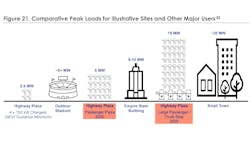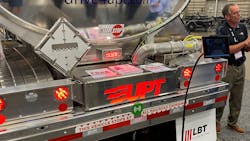As we close out another year, the editors of FleetOwner have picked these 10 stories as a sampling of some of our best work in 2022. They represent the top examples of our reporting, writing, editing, and presentation standards—which is our commitment to you, our industry and readers.
When putting together this list we discovered that our top 10 stories have a couple of common threads: How events affected business conditions in trucking and operations in the industry and how emerging technologies will shape the future of freight hauling.
Without further hesitation, we present our best stories—and wish our industry a healthy and prosperous new year!
10. Cummins unveils fuel-agnostic internal combustion engine strategy
As the industry’s first "unified, fuel-agnostic" engines, Cummins’ platforms will use engine blocks and core components that share common architectures. Cummins’ new design approach will be applied across the company’s B, L, and X-Series engine portfolios, which will be available for clean diesel, natural gas, and hydrogen.
Check out the full story here.
9. Deterring distracted driving to save dollars and lives
“Everything is discoverable in civil litigation,” said Phil Moser, a former police officer and VP of customer development at Driving Dynamics, a provider of driver safety training. “The attorney’s going to jump on there, and they're going to say, ‘If you had forward-brake assist, or if you had had lane-departure assist, lane-keep assist, this crash wouldn't have happened.’”
Check out the full story here.
8. What do drivers really want? Ask them.
That was a common theme among fleet executives who spoke with FleetOwner during the opening day of NPTC 2022, the National Private Truck Council’s annual conference.
Check out the full story here.
7. Survey points to exodus of small operators—and fuel costs as the culprit
The new data shows that half—51%—of carriers that Truckstop.com defines as small fleets and owner-operators are considering job changes in the next six to 12 months, even though 32% of respondents said they have plenty of business and are making 50% to 74% more money. The culprit is surging fuel prices, the survey also shows. The nationwide average price for a gallon of diesel fuel is hovering around $5.60—or about $2.36 more than just one year ago.
Check out the full story here.
6. Grid not prepared for electric truck 'avalanche'
Of course, that's just one truck stop. Clusters of truck-intensive operations could blow a fuse—a really big fuse, as we'll discuss below.
The white paper, The Electric Highways Study, is meant to be a blueprint for the strategic buildout of fast-charging sites along highway corridors to meet an upcoming surge in demand from the electrification of passenger vehicles and commercial trucks.
Check out the full story here.
5. Ukraine update: Understanding risks to U.S. trucking, transportation
There are a lot of articles and reports offering warnings of impending cyber and other attacks from Russia. “It’s too much,” Ben Barnes, chief information security officer and VP of IT services for transportation solutions provider McLeod Software, told FleetOwner. “It all can’t be true in my mind. But some of it probably is—we just don’t know what. So, we have to rest on some of the cybersecurity frameworks that we have in place.”
Check out the full story here.
4. With California law, trucking operations face uncertainty
California Assembly Bill 5 (AB5) set forth a three-pronged legal test for independent contractors that, if failed, would require employers to hire these contractors as employees. The bill was originally intended to affect "gig" economy workers, such as rideshare and food-delivery drivers, and while there are many professions exempted from the law, truck driving is not among them.
Check out the full story here.
3. ‘Nuclear’ verdicts roil and rile trucking
Injury and death occur in truck-involved accidents, despite current government goals of cutting this carnage down to zero—but that’s something safety directors, fleet executives, or anyone in orbit around the issue of nuclear verdicts hear regularly. Many internalize safety. Most make their missions to do better, to not only put their drivers in training but to build whole programs with the goals of constructing "safety cultures," preventing accidents, and staying well clear of plaintiffs' lawyers, judges, and juries.
Check out the full story here.
2. Intellistop’s pulsating rear lamp module caught in bureaucratic darkness
The Federal Motor Carrier Safety Administration (FMCSA) in the last three years has granted four exemptions that allow brake-activated pulsating rear lamps on equipment already in operation with fleets. Tank truck carrier Groendyke Transport secured the first such waiver three years ago, and trash hauler Waste Management obtained the most recent one, just in January.
But a similar application for an exemption from FMCSA regulations, filed by Intellistop in December 2020 and published in the Federal Register last June, has yet to be approved—long after FMCSA was expected to decide; applications usually take 180 days from receipt to a decision from the agency. So, what’s the holdup with Intellistop’s application? Turns out, the delay has to do with federal agencies trying to figure out which of them has jurisdiction.
Check out the full story here.
1. Fleets begin to get a feel for the future of moving freight
While some of these fleets are going with the OEMs that supply their equipment, others are opting to be part of pilot programs with the technology companies that are penetrating the trucking world with promises of robot trucks hauling freight 24/7 across the Sunbelt in the U.S. The autonomous freight moving right now through these pilots and other test programs has human safety drivers on board, who must adhere to hours-of-service rules and other regulations. But the AV companies are still saying that humans could be gone in the coming years. Until then, it’s about testing out lanes and logistics.
Check out the full story here.













